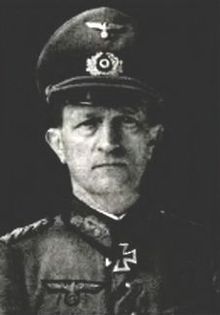Fritz Schlieper
Fritz Schlieper (born August 4, 1892 in Koldromb, Znin district , † June 4, 1977 in Heidelberg ) was a German lieutenant general in World War II .
Life
Schlieper joined the Prussian Army on February 24, 1911 as a flag junior . With the 2nd West Prussian Foot Artillery Regiment No. 17 he was promoted to lieutenant on August 18, 1912 and his patent later dated August 23, 1910. Schlieper took part in the First World War and was awarded both classes of the Iron Cross and the Cross for Faithful Service .
After the end of the war the Reichswehr took over him and he was used in various units. On April 1, 1934 he was promoted to lieutenant colonel and on October 15, 1935 appointed commander of the 17th Artillery Regiment. His promotion to colonel took place on March 1, 1936. On May 1, 1938, he was appointed artillery commander 24 (Arko 24). On September 1, 1939, the beginning of the Second World War, he became Chief of the General Staff of the Deputy General Command of the XIII. Army Corps . From October 23, 1939 he was chief of the general staff of the border section command center. On November 1, 1939, he was appointed major general and quartermaster of the 18th Army . From May 1, 1941, he was in command of the 45th Infantry Division, succeeding Major General Gerhard Körner, who was killed in battle . With the division he took part in the Russian campaign from June 22, 1941 . As part of Panzer Group 2 , his division captured the Brest-Litovsk fortress from June 22 to July 2, 1941 . The promotion to lieutenant general took place on November 1, 1941 and on December 27, 1941 he received the Knight's Cross of the Iron Cross . On February 27, 1942, Schlieper was replaced as division commander by Fritz Kühlwein . From April 15, 1942 to August 1, 1944 was chief of the German army mission in the First Slovak Republic and German general at the Slovak Ministry of Defense. He then retained this function until August 1, 1944. On August 17, 1944, he was appointed Commander Special Staff II of the OKH .
His brother was the later major general Franz Schlieper .
Assessments
In an assessment of March 31, 1944, Field Marshal Wilhelm Keitel u. a. that Schlieper “because of his dry and doctrinal nature did not manage to gain full trust and unreserved recognition in Slovakia”. The historian Christian Hartmann writes that Schlieper was effectively replaced as division commander of the 45th Infantry Division on February 29, 1942, although the official replacement did not take place until March 1, 1942. Hartmann describes Schlieper as very difficult, even quirky. He accuses him of wrong decisions and sees him as an extremely conservative and authoritarian leadership style. The historian attributes to Schlieper and Fritz Kühlwein to another commander who thinks in a similar way that the team soldiers of the 45th Infantry Division, in contrast to the officers, hardly received any medals despite taking part in the toughest battles .
Fonts
- Artillery-tactical collection of tasks. Barbara-Verlag, Munich 1939.
literature
- Christian Hartmann : Wehrmacht in the Eastern War. Front and military hinterland 1941/42. (= Sources and representations on contemporary history, Volume 75), R. Oldenbourg Verlag, Munich 2009, ISBN 978-3-486-58064-8 .
- Wolfgang Keilig : The Generals of the Army 1939–1945. Podzun-Pallas-Verlag, Friedberg 1983, ISBN 3-7909-0202-0 , p. 302.
Web links
- Literature by and about Fritz Schlieper in the catalog of the German National Library
Individual evidence
- ↑ a b Veit Scherzer : Knight's Cross bearer 1939–1945. The holders of the Iron Cross of the Army, Air Force, Navy, Waffen-SS, Volkssturm and armed forces allied with Germany according to the documents of the Federal Archives. 2nd edition, Scherzers Militaer-Verlag, Ranis / Jena 2007, ISBN 978-3-938845-17-2 , p. 665.
- ↑ Reichswehr Ministry (Ed.): Ranking list of the German Reichsheeres. ES Mittler & Sohn , Berlin 1924, p. 159.
- ^ A b Samuel W. Mitcham: German Order of Battle: 1st-290th Infantry divisions in World War II . Stackpole Books, 2007, ISBN 978-0-8117-3416-5 , pp. 91 ( google.de [accessed on May 1, 2019]).
- ↑ Wolfgang Keilig: The Generals of the Army 1939-1945. Podzun-Pallas-Verlag, Friedberg 1983. p. 302
- ^ Christian Hartmann: Wehrmacht in the Eastern War. Front and military hinterland 1941/42. R. Oldenbourg Verlag, Munich 2009, p. 236.
| personal data | |
|---|---|
| SURNAME | Schlieper, Fritz |
| BRIEF DESCRIPTION | German officer, most recently lieutenant general in World War II |
| DATE OF BIRTH | 4th August 1892 |
| PLACE OF BIRTH | Koldromb, district of Znin |
| DATE OF DEATH | 4th June 1977 |
| Place of death | Heidelberg |
